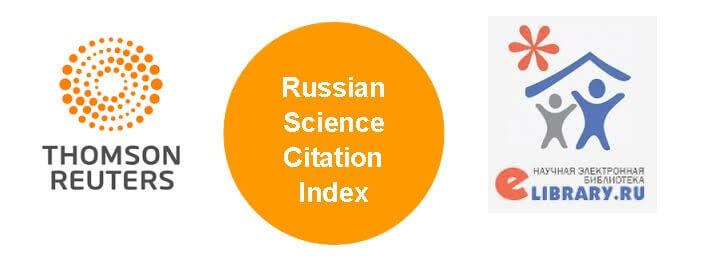Liquidus surface of the quasi-ternary system Cu2S–In2S3–FeS
Abstract
A projection of the liquidus surface of the quasi-ternary system Cu2S-In2S3-FeS was constructed as a result of experimental studies of quasi-binary and non-quasi-binary sections and based on the data on binary systems comprising a ternary system.
Each section (six quasi-binary and four non-quasi-binary ones) was studied separately using complex methods of physicochemical analysis: differential thermal analysis, X-ray phase analysis, and microstructural analysis.
It was found that the quasi-ternary system Cu2S-In2S3-FeS has six fields of primary crystallisation of separate phases and eleven monovariant equilibrium curves along which two phases are co-crystallised. Non-variant equilibrium points were obtained through the extrapolation of the direction of monovariant equilibrium curves.
The quasi-ternary system Cu2S-In2S3-FeS is characterised by 17 non-variant equilibrium points, where Е1-Е5 are triple eutectic points.
The projection diagram of the liquidus surface is characterised by three crystallisation fields of the initial componets (Cu2S, In2S3, FeS), four fields of binary compounds, and one field of a complex compound (CuFeIn3S6).
Since complete solubility of the initial components in liquid and solid states is observed in the quasi-binary section CuIn5S8‑FeIn2S4, the fields of primary crystallisation of CuIn5S8 and FeIn2S4 are absent; they are replaced by an unlimited solid solution based on these components.
The fields of primary crystallisation of Cu2S, FeS, and CuInS2 are the most extensive in the ternary system Cu2S-In2S3-FeS. The reactions occurring at monovariant equilibrium points are presented.
Downloads
References
Tomashik V. Cu–In–S (Copper – Indium - Sulfur). Non-Ferrous Metal Systems. 2006;V11C1(1): 1–19. https://doi.org/10.1007/10915981_24
Binsma J. J. M., Giling L. J., Bloem J. Phase relations in the system Cu2S—In2S3. Journal of Crystal Growth. 1980; 50(2): 429–436. https://doi.org/10.1016/0022-0248(80)90090-1
Rustamov P. Q., Babaeva P. K., Allazov M. R. State diagram of the section FeS-In2S3. Russian Journal of Inorganic Chemistry. 1979;24(8): 2208–2211. (In Russ.)
Raghavan V. Fe-In-S (Iron – Indium - Sulfur). Journal of Phase Equilibria. 1998;19(3): 270. https://doi.org/10.1361/105497198770342337
Manual G. J., Patino F., Salinas E. Medición del contenido calórico de la mata de cobre (Cu2S-FeS) usando un calorímetro de gota. Revista de la Sociedad Quimica de Mexico. 2001;45(1): 13–16. Available at: https://www.researchgate.net/publication/26465784_Medicion_del_contenido_calorico_de_la_mata_de_cobre_Cu2S-FeS_usando_un_calorimetro_de_gota
Patil M., Sharma D., Dive A., Mahajan S., Sharma R. Synthesis and characterization of Cu2S thin film deposited by chemical bath deposition method. Procedia manufacturing.2018:20: 505–508. https://doi.org/10.1016/j.promfg.2018.02.075
Li S., Wang H., Xu W., Si H., Tao X., Lou S., et al. Synthesis and assembly of monodisperse spherical Cu2S nanocrystals. Journal of Colloid and Interface Science. 2009;330(2): 483–487. https://doi.org/10.1016/j.jcis.2008.10.062
Kozer V. R., Parasyuk O. V. Phase equilibria in the quasi-ternary system Cu2S-In2S3-CdS. Chemistry of Metals and Alloys. 2009;2(1/2): 102–107. https://doi.org/10.30970/cma2.0087
Gorai S., Guha P., Ganguli D., Chaudhuri S. Chemical synthesis of b-In2S3 powder and its optical characterization. Materials Chemistry and Physics. 2003;82(320): 974–979. https://doi.org/10.1016/j.matchemphys.2003.08.013
Bodnar I. V., Polubok V. A., Rud V. Yu., Rud Yu. V. Photosensitive structures based on In2S3 crystals.
Semiconductors. 2003; 37(11): 1308–1310. https://doi.org/10.1134/1.1626214
Mitsui H., Sasaki T., Oikawa K., Ishida K. Phase equilibria in FeS–XS and MnS–XS (X = Ti, Nb and V) systems. ISIJ International. 2009;49(7): 936–941. https://doi.org/10.2355/isijinternational.49.936
Terranova U., de Leeuw N. H. Phase stability and thermodynamic properties of FeS polymorphs. Journal of Physics and Chemistry of Solids. 2017;111: 317–323. https://doi.org/10.1016/j.jpcs.2017.07.033
Thomere A., Guillot-Deudon C., Caldes M. T., Bodeux R., Barreau N., Jobic S., Lafond A. Chemical crystallographic investigation on Cu2S-In2S3-Ga2S3 ternary system. Thin Solid Films. 2018;665: 46–50. https://doi.org/10.1016/j.tsf.2018.09.003
Hurman Eric R. Activities in CuS-FeS-SnS melts at 1200. Metallurgical Transactions B.1993;24(2):301–308. https://doi.org/10.1007/bf02659132
Womes M., Olivier-Fourcade J., Jumas J.-C., Aubertin F., Gonser U. Characterization of the single phase region with spinel structure in the ternary system In2S3–FeS–FeS2. Journal of Solid State Chemistry. 1992;97(2): 249–256. https://doi.org/10.1016/0022-4596(92)90032-q
Olekseyuk I. D., Parasyuk O. V., Kozer V. R. Research of systems of type Cu (Ag) In5S8 - FeIn2S4. Naukovii vіsnik Volins’kogo natsіonal’nogo unіversitetu іm. Lesі Ukraїnki: Khіmіchnі nauki. 2009;24: 3-8. (In Ukrainian)
Mirzoeva R. J., Shikhalibeyli S. Sh., Allazov M. R. Investigation of the CuInS2-FeS semiconductor system. In: Physico-chemical processes in condensed matter and interphase bondaries: Proc. 7th All-Russian Conf., 10–13 November 2015. Voronezh: Nauchnaya Kniga Publ.; 2015. p. 371. (In Russ.)
Trukhanov S. V., Bodnar I. V., Zhafar M. A. Magneticandel ectricalproperties of (FeIn2S4)1–x(CuIn5S8)x solid solutions. Journal of Magnetism and Magnetic Materials. 2015;379: 22–27. https://doi.org/10.1016/j.jmmm.2014.10.120
Glazov V. M., Vigodorovich V. K. Microtverdost metallov i poluprovodnikov [Microhardness of metals and semiconductors]. Moscow: Metallurgy; 1969. 248 p. (In Russ.)
Abdullayeva Sh. S., Mammadov F. M., Bakhtiyarly İ. B. Quasi-binary section CuInS2–FeIn2S4. Russian Journal of Inorganic Chemistry. 2020;65(1); 100–105. https://doi.org/10.1134/s0036023619110020
Bakhtiyarly I. B., Abdullayeva Sh. S., Gurbanova R. J., Mammadova F. M. Guseynova Sh. B. Study of interactions in the CuInS2–FeS system. Russian Journal of General Chemistry. 2019;89(8):1281–1284. https://doi.org/10.1134/s1070363219080188
Copyright (c) 2021 Kondensirovannye sredy i mezhfaznye granitsy = Condensed Matter and Interphases

This work is licensed under a Creative Commons Attribution 4.0 International License.













